Crossing Tacks with the Great Dane
Published on December 11th, 2016
The passing of Paul Elvstrom has opened the memories of those blessed to cross tacks with the Great Dane. Bruce Kirby, Canadian-born sailboat designer, racer and journalist, shares some of his treasures from the past…
We met at the 1956 Olympics in Melbourne when we were both sailing the Finn. I was representing Canada. Paul had already won two Gold Medals and was the odds on favorite to take a third. Two days before the first race he went out in very heavy air to practice and, I believe also, to prove to the rest of us that he sailed on quite a different level.
After about 45 minutes he came towards the beach where all the rest of us were working on our boats. There was a steep sea. Paul was on a dead run and standing up. The yacht club anemometer registered the wind at 25 knots gusting to 30.
As he got near the beach he threw in two quick jibes, then came beam on to the wind with sail luffing and had a brief conversation in Danish with his backup helmsman who was on the dock, then sheeted in and went back out for another 20 minutes.
He won the seven race series with five bullets. The two races he didn’t win were in lightish air where his superb physical conditioning did not count for as much.
The first taste I had of his legendary sense of humor and broad quick toothy smile came after he was ashore and I said to him “I’m surprised you’d would go out in that much wind with a brand new sail.” He answered “I wouldn’t go out in it with an old sail.”
In 1956, we were still using Egyptian cotton sails and the convention was that they had to be carefully broken in in by reaching around in moderate air. Two years before Paul had become a sailmaker and he had a different idea.
At the Melbourne Games, the friendly American entry John Marvin – an MIT undergrad who ended up winning the Bronze – immediately befriended Elvstrom after the boats were allotted to the competitors. John was very close to the same build as Paul – just under six feet and just above 190 pounds.
Within minutes Paul and John were leaning over John’s Finn and Paul was showing him how to set his hiking straps, the best traveler settings, how Paul would sheet in the expected heavy air, and in general trying to bring the American into the Finn picture.
He did the same thing for the Burmese entry, who was a big powerful South East Asia wrestling champ who also sailed and thought he’d do better on the water than wrestling the huge Russian and American heavyweights in the gym.
And this largess was at the Olympics with podium places up for grabs.
The next sailing Olympics was Rome 1960 with sailing on the Bay of Naples where the wind was light to medium and shifty. I did not try out that year as we had just produced the second of two daughters. Paul won without having to sail the final race. He told me later that he had spent months after Melbourne teaching himself how to sail in light air.
His first Gold Medal had come at the age of 20 in the 1948 Games in England. They were sailing singlehanded in a little British sloops called a Firefly. He fouled out of the first race and then picked up the pace. It was blowing very hard for the final and Paul, young as he was, out-clevered his older competitors.
The American Ralph Evans, the Frenchman and Paul could win the regatta by taking that race. On the sly, Paul stretched two pieces of shock cord across his foredeck before going out. The wind mounted throughout the race and was blowing 30 knots for the beat to the finish.
He dropped his jib at the leeward mark and stuffed it under the shock cord, then hiked like only he could do, sailed a bit low and very fast to take the race and the Gold. The American won the Silver.
About 50 years later, Paul was visiting our home in Connecticut and I asked him if he would like to see Ralph Evens, whom I knew worked nearby. I was able to track him down and watching the two of them meet in our living room for the first time since stepping off the podium in 1948 was a great experience for all of us. The story that the second two boats had capsized in that final race is wrong although there were several capsizes further back. The American and Frenchman were simply outsmarted by a young lad from Denmark.
In 1964 the Games were in Tokyo and the sailing was about 30 miles to the south at the beautifully prepared Enoshima harbor. Again I raced the Finn, but Paul attended as coach of the Danish team and I saw a lot of him.
In the heavy air fourth race I was struggling to recover from a second tier start and on the second broad reach of the course I had grabbed a wave and was surging past to windward of the Russian who inexplicably did a right angle turn right in front of me. There was no way to avoid him and my boat rammed his just aft of the mast and flipped him on his side. He continued on around and the last I saw of him he was groping around the bottom of his boat trying to figure a way to get it upright.
A couple of minutes later I realize the Russian had thrown a violent and legal luff. In those days when you fouled you dropped out of the race, so I sailed off to the side and angrily made my way upwind to the harbor.
I saw Paul when I got ashore, told him the story and asked him what he would have done. He turned on the smile and said “if he was upside down he could not have hoisted a protest flag.”
I learned later that I had blanketed the Russian and he had lost control of his boat and broached into me.
This was the same race in which American Peter Barrett also had to flip onto port after the start and had dropped out of the race when the sleeve of his shirt grazed the rudder of a starboard tack boat. The other helmsman was not aware of the miniscule contact, but Peter played by the rules and although he knew it would probably cost him the Gold, he withdrew and sailed off the course. He won the Silver.
In 1966, Paul decided to try his hand at the Star class, which was laced with Olympic medalists and world champions. He chose Swede John Albrechson as crew and with very little time in the boat they entered the Worlds at Kiel, Germany. There were 84 boats and it blew hard throughout, sometimes very hard.
I was there with my big brother David as crew, having qualified by winning the District Four (Great Lakes) championship a month earlier.
The following throws light on Paul’s genius. He won the first race by a tidy margin. The fleet trudged upwind to the harbor, but Paul stayed out for another hour, When he came ashore and hoisted his boat into the dry sail area everyone was stunned to see him lift his rig out. Not only that, but with quite a bit of wind blowing he lifted the mast out by himself and handed it down to Albrechson. I had never seen anyone do that before (This was during the days of wooden masts). He then made two or three subtle changes to the rig, including a change to the spreader angle, and put it into the boat by himself.
So he had won the first race in a very competitive fleet of 84 Stars and then changed the tuning of his rig! What?! Next day he won by a larger margin. He won the event handily and the following year won again in his native Denmark.
In 1975, the Quarter Ton Worlds was at Deauville, on the French north coast near the Normandy beaches. Paul was there in a boat he had helped design. I was sailing with George Wilkinson of Vancouver in one of my Quarter Tonners.
Our boats were similar in concept – fairly heavy with a lot of sail but mediocre surfing ability. The event was won by Bruce Farr’s 45 Degrees South, a light, flat boat that surfed easily but was not outstanding in light air. We had very little light air and the Kiwi boat launched Farr on his remarkable career.
On the long distance race, which took us across the English Channel, around a lighthouse near the English coast and return, we found ourselves in a bow to bow match with the Elvstrom boat on a beam reach. Neither could gain an inch for about an hour.
Then Paul, who was not steering, went down to the lee side, stared long and hard at his jib trim, and apparently made a very small adjustment. Within a couple of minutes his boat started to edge out on us, ever so slowly but quite definitely.
As the sail trimmer on our boat I slipped down to the lee side, looked long and hard at the jib and the main/jib interaction, studied the mainsail twist, but could see no adjustment that I thought might improve our speed.
What had Paul done to get that tiny edge, or, I wondered later, had he done anything at all but had made us sure he had and had caused a disruption of our concentration???
I was elated to see Paul during the 90s when he was talked into coming over to St. Frances Yacht Club for the annual Masters Regatta. There were 20 entries from around the world and I was flattered to have been invited five years in a row. Paul was in a relaxed mood with the big grin working overtime.
He was in his 70s, like most of us, but had not been doing any serious racing for several years. However, he was so good in brisk weather that he was the favorite if the San Francisco Bay thermal blessed the race course with its 15 to 20 knot winds.
It did for the first couple of races and Paul won one of these and was well positioned when the Bay let us down. We ended up with light and shifty, find it if you can, winds, and a mixed up finishing order in which Paul was not on top. On the way to the finish line in the final race we found ourselves about 50 yards ahead of Paul with about 500 yards left to go.
In the dozens of races I had sailed against him in different classes I had never once crossed the finish line ahead of him. This was going to be it! But he did the Elvstrom tango and somehow nipped us by a length.
The sad part came that evening when all the skippers were called upon to make a short speech. To the surprise of everyone, Paul announced that he had sailed his last race. He was retiring altogether from racing.
It is literally true that in that big room that night strong men cried.


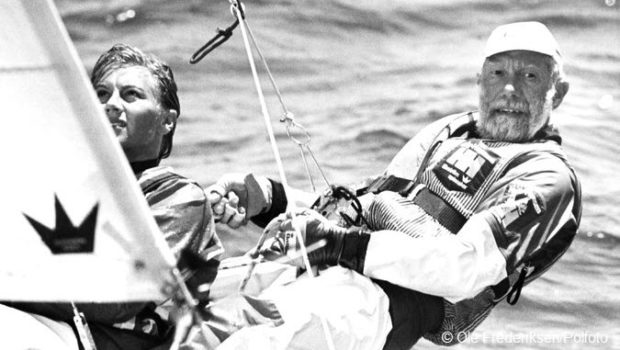
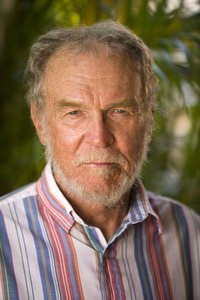

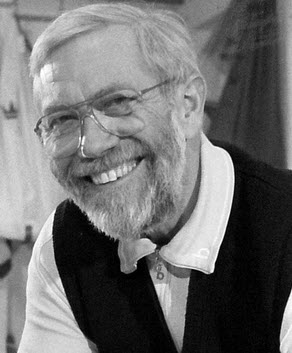


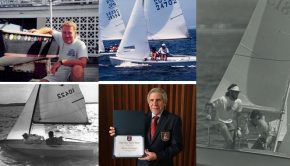
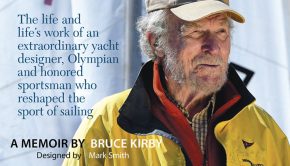
 We’ll keep your information safe.
We’ll keep your information safe.